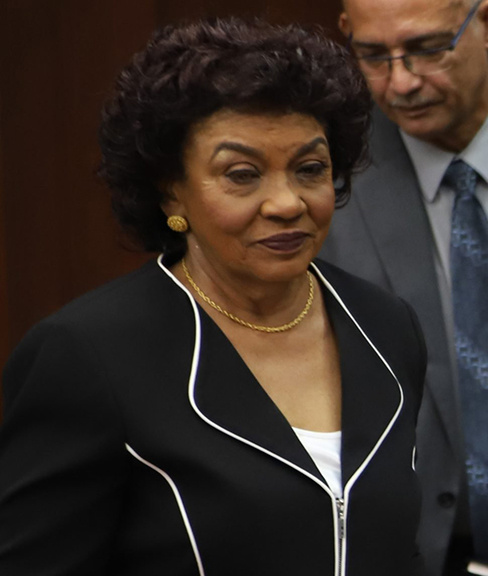Counsel for Guyana Elections Commission (GECOM) Chairperson Claudette Singh has asked the Appeal Court to dismiss the challenge to the national recount of votes from the March 2nd polls being mounted by Misenga Jones and Attorney General Basil Williams, saying the grounds cited lack merit.
Jones, who initiated a challenge in the High Court that was dismissed on Monday by the Chief Justice, has appealed and a hearing is due to be held today on her submissions and those of the respondents, including Williams, who has filed a cross appeal.
In her written submissions to the court, attorney Kim Kyte-Thomas, who is representing Singh, has asked that Jones’ appeal be thrown out, while arguing that the findings of the Chief Justice Roxane George-Wiltshire represent the long-established jurisprudence of electoral laws in respect to the issues raised before the court.

In the circumstances, Kyte-Thomas argues that the appeal “is frivolous, vexatious and amounts to an abuse of the Court’s process.”
Asking that the Chief Justice’s decision be affirmed, the lawyer said that the orders being sought by Jones cannot be determined by way of judicial review proceedings and instead must be pursued by an election petition.
For this reason, she said that the court is estopped from enquiring into whether any function of GECOM or of any of its members has been performed validly or at all except as provided for under the exclusive jurisdiction of the High Court by way of an election petition.
As her client has contended in the court below, the very Court of Appeal and the Caribbean Court of Justice also, Kyte-Thomas said that the issues raised in Jones’ application are res judicata –were already litigated and decided upon and therefore cannot be canvassed again.
The lawyer advances, too, that the constitutionality of Section 22 of the Election Laws (Amendment) Act, through which the recount was effected, is best suited for an election petition and should not be permitted in applications such as that brought by the appellant “to interrupt the electoral process.”
“Moreover, it is well established that constitutional questions can also be determined at the hearing of a petition,” the lawyer said.
To entertain such a challenge at this point she added, would be premature. Citing case law authority, the lawyer noted that “any challenge to any part of the election process can only be conducted pursuant to an Election Petition and before an election court.”
She said that any challenge to the validity of an election and any dispute or claim of any irregularities or illegalities in relation to an election can only lawfully form the basis of an election petition after the result has been declared.
Again referencing case law, she noted that “any matter which has the effect of vitiating an election should be brought up only at the appropriate stage in an appropriate manner before a special tribunal and should not be brought up at an intermediate stage before any court.”
An election dispute
Kyte-Thomas said it is obvious from the conduct of the appellant that her intention is to have the election annulled on the basis of alleged irregularities. This, she said, is, however, not permissible at this stage, but has to be done by way of an election petition.
The attorney said that Jones’ application must be and can be distinguished from the case of Reaz Holladar, where the Chief Justice found judicial review was applicable because the issue to be determined was whether there was compliance by Returning Officer Clairmont Mingo, an election officer This was held not to be an “election dispute”.
She said, too, that the recent Court of Appeal decision in the Ulita Moore case—another of the several challenges mounted to these elections—is also distinguishable.
The appellate court, she reminded, held that the High Court had the jurisdiction to hear that case which concerned the lawfulness of a GECOM decision to undertake a recount of the votes cast in March 2 elections and ruled “On the main issue in this appeal, we have found that the jurisdiction of the High Court can be exercised to grant relief during the election process in spite of Section 140(1) of the ROPA. That jurisdiction can be exercised where the Court is satisfied that GECOM has acted or is about to act in excess of its constitutional and/or statutory powers.”
Kyte-Thomas noted that there, however, there must be a finding that GECOM was about to act or has acted in excess of jurisdiction. On this point, she submitted that GECOM was simply attempting to execute its constitutional mandate to complete the electoral process pursuant to a transparent process of re-counting the votes from the ballot boxes.
She referenced, too, where the CCJ had said that “unless and until an election court decides
otherwise, the votes already counted by the recount process as valid votes are incapable of being declared invalid by any person or authority.”
She went on to note, also that far from Jones’ arguments that Order 60, the recount order, and by extension the recount process were invalid, the CCJ explicitly endorsed it.
Kyte-Thomas said that at no stage did the CCJ determine that a final credible count could not be established pursuant to Order 60 and it did not set aside Order 60. The intent of Order 60, she argued, was to determine the final credible count by recounting all ballots cast on 2nd March from the boxes and not to trespass upon the exclusive jurisdiction of the High Court.
In the circumstances, she said, these issues are res judicata, while adding that even if during an election petition a court finds that Order 60 is in tension with any constitutional provision, it would only be void to the extent of any such inconsistency and as such would not operate to vitiate the entire recount process.
Meanwhile, Kyte-Thomas also submitted that the CEO is a statutory officer subject to the disciplinary control of the Commission and that nothing the CEO does in relation to the elections is exempt from the direction, instruction, or supervision of the Commission.
She said he is bound by Order 60, which has not been set aside by any court and cannot be permitted to flout the clear instructions and directions of the Commission. It is for this reason the lawyer said, that the report of the CEO invalidating nearly 116,000 votes was deemed null and void by the CCJ.
The CCJ had said that the idea that the CEO or GECOM could, in an unaccountable, non-transparent and seemingly arbitrary manner, without the due processes and the legal standards established in Article 163 and in the Validation Act, disenfranchise scores of thousands of electors is entirely inconsistent with the constitutional framework.
“Whatever allegations of irregularity attended those votes (and we neither agree nor disagree as to the existence of such irregularities) must be adjudged by the High Court under Article 163 as was correctly stated by the Chairperson of GECOM,” the CCJ said.
On those grounds, Kyte-Thomas has contended that Jones’ appeal be dismissed as well as the cross appeal filed by the Attorney General.





